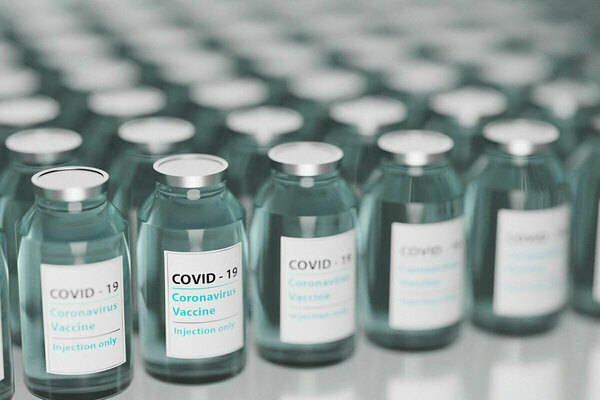
On January 24, 2020, the first cases of COVID-19 in Europe were confirmed in Haute-Savoie, France. As government officials raced to develop containment measures, the scientific community had already swung into action. By mid-January, the German firm BioNTech had launched “Project Lightspeed,” its drive to develop a vaccine against the novel coronavirus. By March, the firm would sign an agreement with American pharmaceutical firm Pfizer to test, manufacture, and distribute its vaccine to the world. By April 2020, BioNTech had begun its first clinical trials in Germany—less than three months after the SARS-CoV-2 virus was genetically sequenced—when most vaccines take 5-10 years to develop. In the end, with nearly 3 billion doses projected to be produced in 2021, the push has been heralded as one of the most astounding feats of scientific development in human memory. In historical terms, the Pfizer-BioNTech vaccine was developed with both astonishing speed and remarkable effectiveness.
Despite this early and lasting contribution, over a year into the pandemic Europe seems to have fallen behind other world powers in both the vaccination of its own citizens and the exportation of doses to the many countries still awaiting relief. While missteps in the rollout of vaccines to its own people have generated some consternation within Europe, the resulting delay in vaccine exports may end up having one key advantage: Europe is well-poised to capitalize on the high quality of its vaccines and avoid the embarrassing real-time adjustments made necessary by its rivals’ mad dash to deliver less reliable products abroad.
For example, China has bet that what will matter most is speed. By March 2021, the Chinese government had already pledged to distribute more than 500 million doses of its domestically developed vaccines to countries still suffering, enough to vaccinate roughly 1 in every 13 people living outside of China. In contrast, by mid-April, the EU had committed only 113.5 million doses for export, which would only be possible by rerouting vaccines originally bound for its own citizens. By mid-May, that number had risen to around 200 million, still far behind China. By falling behind, Europe not only stands to lag in playing its role in the global recovery, it also risks losing the race to gain global standing and influence in the process, a strategy commonly referred to as vaccine diplomacy. For some, seeing China take a leading role in combating the COVID-19 pandemic is only fair, considering the outbreak of the novel coronavirus in late 2019 emanated from the central Chinese city of Wuhan. Nevertheless, with every Chinese cargo plane that lands abroad—and with Russia shipping its highly effective Sputnik V vaccine around the world as well—the pressure increases on Europe and the United States to get in the game or risk losing influential ground to its rivals. When asked about being outpaced by China in the race to distribute vaccines around the world, French President Emanuel Macron admitted in February that it was “a little bit humiliating for us.” But speed has never been a strong suit for Europe.
There’s no question that, in terms of vaccine diplomacy, Europe has yet to play a role on the world stage commensurate with its resources and reputation as a global leader. Most observers note that Europe’s struggles start at the systemic level. They argue, in short, that Europe is simply not well-disposed to handle crises. Despite its vast economic and scientific resources, advanced pharmaceutical industry, and demonstrated dedication to solving issues of public health at the governmental level, the European Union’s highly decentralized structure means that swift, bold action is, by design, virtually impossible. In contrast, the authoritarian governments of Russia and China can implement top-down responses quickly, with less consideration for individual rights and minimal input from stakeholders. As Macron conceded, “[I]n the very short run, we can be impressed by the Chinese efficiency.” For example, the Chinese government famously locked down the entire city of Wuhan—some 11 million people—for 76 days as the pandemic unfolded in early 2020. It also employed compulsory large-scale PCR testing to address local outbreaks, testing as many as 1 million people per day in targeted areas.
By contrast, despite the remarkable success of BioNTech, Europe’s weak coordination led it to invest too little too late in finding its way out of the pandemic. For instance, the EU only launched its vaccine development initiative in June 2020, a month after the United States announced Operation Warp Speed and six months after the first cases were diagnosed in the West. By contrast, China and Russia were already rolling out emergency doses to send abroad as early as September 2020, though this was faster than what most researchers and regulators recommended. Likewise, while data for public investment in vaccine development in China are unavailable, Europe invested far less in vaccine development and production than the United States, staking a paltry $9.01 per adult compared to $70.58 under Operation Warp Speed. It is perhaps not surprising, then, that other European firms like CureVac (Germany) and Sanofi (France) have still been unable to produce an effective vaccine for approval, though CureVac’s could come soon.
Europe seems to bet that, like the tortoise in Aesop’s famous fable, slow and steady will win the race. And it might be right.
Overall, the factors impacting the EU’s vaccine diplomacy mirror the characteristics of Europe itself: bureaucratic by nature, collegial by design, and focused on quality over quantity. Yet these characteristics—while causing Europe to get off to a slow start with its vaccine diplomacy—might prove to be among its greatest assets. Europe seems to bet that, like the tortoise in Aesop’s famous fable, slow and steady will win the race. And it might be right.
Early signs suggest Europe may still come out ahead in the long run. Despite early ineptitude in the procurement of vaccine doses, EU governments showed remarkable solidarity in tasking the European Commission with purchasing and distributing vaccines equitably across all member nations, an experience that will serve Europe well in the future. Even the controversial decision in March to pause distribution of the AstraZeneca vaccine while potential side effects were investigated displayed Europe’s commitment to experience over expediency. Perhaps most importantly, however, through its deep pockets and aggressive purchasing of doses, mostly from the U.S., Europe is well on its way to a successful vaccination campaign of its own, with roughly a third of Europeans currently having received at least one dose. This means that European countries with more doses than they need—and the EU as whole—can now enter the vaccine diplomacy race, albeit belatedly.
Finally, Europe’s penchant for caution and preference for quality are beginning to serve them well. Despite early inroads, China’s vaccines have recently seen some embarrassing setbacks due to low efficacy or lack of transparency surrounding their approval. Highlighting this tension, Singapore allowed an entire shipment of Chinese-made vaccines to languish in a warehouse while it rolled out the more effective mRNA-based versions from Pfizer-BioNTech and Moderna. On the other hand, because most of the vaccines Europe has available for export are highly effective, Europe stands positioned to be a major player in vaccine diplomacy at last. If production continues and receiving countries opt for a surer bet, Europe may yet win the race.
Further recommended reading on the subject
- Sarah Wheaton and Jillian Deutsch, “Europe Prepares Late Entry in Vaccine Diplomacy Race,” May 6, 2021, Politico, https://www.politico.eu/article/eu-europe-excess-coronavirus-vaccine-doses/.
- Smriti Mallapaty, “China’s COVID vaccines are going global — but questions remain,” May 1, 2021, Nature, https://www.nature.com/articles/d41586-021-01146-0.
- Denis Cenuşa, “The EU’s Vaccine ‘Non-Diplomacy,’” Jan 25, 2021, International Politics and Society, https://www.ips-journal.eu/topics/foreign-and-security-policy/the-eu-fails-at-vaccine-diplomacy-4933/.
About the author

Justin McDevitt, J.D., M.A., teaches “Global Perspectives” at Holy Cross College and is completing his Ph.D. in comparative politics at the University of Notre Dame. His areas of interest are religion and politics, immigration law and politics, and the politics of the COVID-19 pandemic. His recent course, “The World in Pandemic,” has been featured in several conferences and publications. He is also the assistant director for alumni relations and career development with the Moreau College Initiative, a partnership between Notre Dame and Holy Cross College that offers a college education to incarcerated students at Westville Correctional Facility. Justin is a grateful alumnus of the Nanovic Institute’s Berlin Seminar for Transnational European Politics.
This article was originally published by at eitw.nd.edu on August 19, 2021. Europe in the World (EITW) provides accessible analyses and commentary on Europe’s political, social, and economic relations with the rest of the globe. It is a platform for scholars of Europe to present their ideas in a form that helps bridge the gap between the academy and the general public.